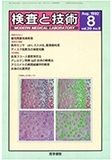Japanese
English
- 有料閲覧
- Abstract 文献概要
目的:後天性免疫不全症候群(AIDS)の流行は輸血の危険性に対する関心を大いに増加させた.多くの輸血は今では自家輸血であり,もしこれができない場合では,医師も患者も輸血の有用性にもっと疑問を持つようになってきた.われわれは手術前輸血の危険性を評価し,そしてそれに対するヒト免疫不全ウイルス(HIV)感染の寄与の程度を調査した.
方法:われわれは意思決定分析により,生命の損失日数に対するHIV感染による危険度を評価した.急性輸血反応,B型肝炎そして非A非B肝炎のリスクへの寄与度も推定した.感度分析により血液供給源からのHIV感染についての最近の情報や,C型肝炎の新しい検査法と輸血の危険性の関係が示される.
PURPOSE : The acquired immunodeficiency syndrome epidemic has greatly increased concern about the risk of blood transfusion. Many transfusions are now autologous, and when these are not available, both physicians and patients are more likely to question the advisability of transfusion. We evaluate the risk of preoperative blood transfusion and the contribution of human immunodeficiency virus (HIV) infection to that risk.
METHODS : We used decision analysis to characterize the risk associated with HIV infection in days of life lost. The contributionsto risk of acute transfusion reaction, hepatitis B, and non-A, non-Bhepatitis are also estimated. Sensitivity analyses show the implications for transfusion risk of recent information about HIV infectionin the blood supply and a new test for hepatitis C.
Copyright © 1992, Igaku-Shoin Ltd. All rights reserved.


